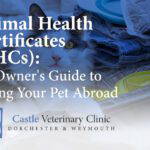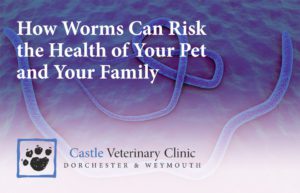Things have moved on since the days when we’d liberally coat our pet in powder at the beginning of the summer and sit back to congratulate ourselves on dealing with fleas.
Advances in our understanding of pet care and the parasites that can make their (and our family) life a misery mean that we can now identify more of these pests, discover what’s working and – more importantly, what isn’t working – in our local area, and give our friends even better care.
But what’s the best way to do this? You could chuck everything available at them just to make sure, or you could spend hours researching scientific advances and new emerging threats and medicines designed to tackle them, then ask your vet to prescribe the best treatment for each that you’re able to identify. But we think both of these are – quite literally – overkill.
We’ve put together the 5 things we think are most important when thinking about parasite protection.
To make it even easier, we’ve got a short quiz online that can help you decide what’s right for your pet once you’ve read the key points below. And if you’re local and would like the reassurance that your pet isn’t being over-treated by products that might not be suitable, we’ve designed a preventive healthcare plan that is tailor-made for your pet and your family life. The Castle Care Club gives you total reassurance that your pet will remain safe from parasites most likely to bother them, all year round.
1:
Fleas aren’t just a summer problem
Centrally heated homes and soft furnishings that provide perfect hide-outs for fleas and eggs mean that they can attack at any time of the year, not just in the summer months. Fleas can live for 100 days and lay dormant without a host in carpets, bedding and furniture just waiting for a time to attack. They can bite us as well as cause infection and discomfort in our pets. They can also pass on tapeworm to dogs and cats, so really need to be controlled by prevention rather than treatment.
2: Lungworm is becoming a bigger issue for both dogs and cats
3:
Pets can now travel with pet passports, and be exposed to parasites we don’t always see in this country
We think it’s great that pets can now travel abroad and we can help you obtain a Pet Passport to make this possible. We always advise that you take extra precautions to make sure they aren’t attacked by parasites not commonly found in this country, and the treatments required by the passport alone aren’t enough to cover this.
Many countries have issues with sandflies who can transmit a disease called Leishmaniasis. This can result in skin ulcers, but also nasty systemic diseases. As we know, mosquitos can carry many diseases, but heartworm is the most likely one to impact on the health of our dogs. We can’t tell if a mosquito is a carrier, and one bite from an infected one can give your dog heartworm disease which is difficult to treat.
Both of these are easy to prevent, so it’s just common sense that your dog (or cat if they’re travelling) is protected against them before you leave.
IMPORTANT – Pet Travel after Brexit!
The regulations governing pet travel are subject to change if we leave the EU. If you are considering travelling with your pet, we advise that you plan this well in advance. We’re happy to advise you on the pet travel certification required at the time of travel, and updates on this are posted here www.gov.uk/guidance/pet-travel-to-europe-after-brexit
4:
Ticks can be an issue for explorers
Exploring undergrowth and walks through farmland and rural areas are all part of the fun for many of our pets. If your pet explores then they are likely to encounter ticks. These tiny parasites wait on in the undergrowth just waiting for a host to wander by, and will then attach themselves by burying their head into their skin to enjoy a blood meal.
It’s often tricky to find them until they become the size of a large lentil, and by this time your pet might have started scratching to get them off. This can cause skin damage, but if they remove them and the head stays inside then nasty infections can develop. Ticks are also carriers of diseases including Lyme disease which is a nasty bacterial disease that can cause chronic conditions in pets, and be passed to humans.
There are several products designed to prevent ticks from feasting on your pet, and with all parasites this simple protection is much better than dealing with long-term problems associated with attack.

5:
Your cat’s preferences count!
We know that cats are fickle creatures who live by their own rules and barely tolerate ours.
Their views and preferences count, so if you don’t think they’re going to enjoy being given a spot-on treatment for parasites once a month but you want them to be fully protected, then talk to us about the best products for you.
We can provide you with treatments that only need to be used four times a year and are therefore more likely to go on then once a month options. And if even this is too much, we can talk to you about alternatives.
To take our quick online quiz to find out which parasite prevention treatments are best suited to your individual pet, click here
If you’d like to discuss parasite control or preventative healthcare with us, call us on:
Dorchester (Poundbury) 01305 267083
Weymouth 01305 813303








